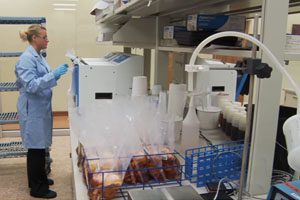
Meat Recalls Due To Bacterial Contamination Meat recalls this year alone number 52 due to bacterial contamination. Ten of this year’s recalls were the result of routine U.S. Department of Agriculture (USDA) testing. While most meat recalls where small, some like the Topps ground beef recall and Cargill ground beef recall where associated with outbreaks […]

Meat Recalls Due To Bacterial Contamination Meat recalls this year alone number 52 due to bacterial contamination. Ten of this year’s recalls were the result of routine U.S. Department of Agriculture (USDA) testing. While most meat recalls where small, some like the Topps ground beef recall and Cargill ground beef recall where associated with outbreaks of E. coli poisoning. Each year, the USDA tests thousands of meat and poultry products for bacteria, including E. coli 0157:H7—Escherichia coli 0157:H7—one of hundreds of E. coli strains. Strain 0157:H7 is quite virulent and produces a powerful toxin that can cause severe illness and even death and is the leading cause of food and waterborne illness in the United States.
The federal government may move to keep meat off the market until its tests confirm the meat does not contain harmful bacteria, such as E. coli 0157:H7. The USDA, an agency which regulates meat and poultry, may require meat producers to hold products that have been routinely tested by the government until test results come back, an additional step in meat and poultry processing that officials say could have prevented some of this year’s meat recalls.
Companies are legally allowed to ship meat ahead of test results, which take a few days. Most tests are negative but when tests are returned as positive and the meat has already been shipped, recalls follow, and consumer can become ill, some fatally. To maintain a balance between business and public health concerns, the USDA has not required meat and poultry products be held pending test results. Some products, such as ready-to-eat salads containing meat, have a very limited shelf life—perhaps of only a few days. If the products are held pending test results, the food is no longer desirable. Fresh ground beef has a life span of several weeks; frozen meat products can last months.
According to the American Meat Institute (ANI), some large meat companies, such as Hormel, hold meat while it’s being tested. Several years ago, the USDA and AMI advised – but did not require — companies to hold meat pending government testing and more companies did but not enough.
Last year, the USDA tested 12,000 samples of ground beef for E. coli O157:H7. Of the 12,000 samples tested, 20 tests were returned back as positive and eight recalls were mandated. Five recalls were instituted following routine USDA tests. The five recalls involved nearly 20,000 pounds of beef and no reported illnesses. This year’s recalls resulting from routine USDA tests involved 43,000 pounds of ground beef, chicken, turkey, and ham products, plus th largest meat recall being that of over 21 million pounds of frozen hamburgers from Topps Meat. Contamination was discovered as a result of consumer illness reports. This type of recall typically happens weeks after meat has been shipped due to the time it takes for meat to be eaten and for a contamination link to be made to the meat.
Meanwhile, there is a little-known practice that the USDA follows that has been termed the “E. coli Loophole” and that allows meat companies to cook and sell meat on which E. coli is found during processing, since high cooking temperatures will kill off the bacteria.
The personal injury attorneys at Parker Waichman LLP offer free, no-obligation case evaluations. For more information, fill out our online contact form or call 1-800-YOURLAWYER (1-800-968-7529).


